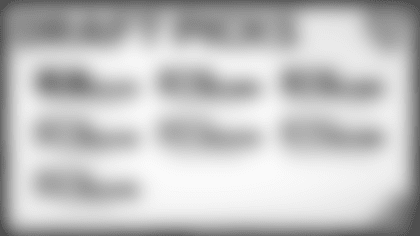EA: What are you feeling right now with the draft literally scheduled to start in a couple of hours?
RH: I would say more than anything, excited and prepared. It's been a year in the making, so if you're not prepared at this point — you're in trouble. We've done everything we can in terms of visits, talking to coaches and evaluations from our side, from the coaches' side, and meetings together to kind of tie all of it in together to get the Jets' final grade. We're ready. The draft is such a crazy process because it unfolds before you and you just roll with it, and you have to adjust on the fly and adapt well while it's unfolding.
EA: What are you going to be like in the Jets Draft Room with this all going on? You just have a sense of calm about yourself right now.
RH: It is initially calm and the excitement builds up until you get about three to five picks away, and then you're like, "Okay, here we go." Then you start, you wait for it. Because then, depending on how many guys that you have prioritized or fixed on at that spot, you start calculating. Okay, we've got these guys who we really like and they're this many picks away. Then you see a name get pulled off and peeled off and you're like, "All right, let's go. Move to the next one."
EA: Mike seems like a consistently calm presence. Todd is also steady— he'll tell you exactly how he feels, but he's steady. What's it like in the Draft Room? Is it quiet?
RH: Yeah, it really is. It's just, especially because the whole room feels it, the gravity of it building up to our selection. Everything's a little bit looser earlier with more picks before you, and then as the picks start getting closer, the anticipation increases and you sense it because you know what's coming. And then the pick before you start counting down and there's five minutes on the clock... three minutes on the clock... we're a minute from being on the clock.
EA: How many prospects did you guys write up?
RH: We wrote around 1,500 individual players.
EA: 1,500 players?
RH: 1,500 players. Yeah. We went to over 300 schools, 1,500 players, over 3,000 evaluations and reports were written. We attended 133 pro days and 8 all-star games.
EA: Unbelievable.
RH: Yeah, so we were, in terms of coverage, well represented.
EA: What happens at the end of the night in terms of restacking the Big Board? And Friday as well?
RH: It's not really restacking it because you have it stacked according to the talent level or any other outside, extenuating circumstances depending on if there's durability, or injuries, or things like that. You don't really change the stack, but it just gives you a chance to identify your needs and priorities versus best available.
EA: How long is the meeting at the end of the night?
RH: Usually it's a quick review. Maybe an hour. What's coming up tomorrow in terms of possible trades and possible scenarios, probabilities that could happen. It also gives you an idea of hypothetically speaking, that five or six players at a position come off the board in the first round — then the next player's value and importance level has risen not only for, say, us, but also for the league because the top six are gone and they are off the board. You have to live through the runs. If there's a run on a position, teams have to adjust, "That player's gone. We need that position. We've got to go get the next one on our board."
EA: How would you describe Mike Maccagnan as a scout? RH: Extremely thorough. Obviously experienced. That's a good thing that he's been in this 25, 26, 27 years. He studies everything — not only the individual but the whole landscape of the draft — and he's extremely thorough with each one of the players and he listens to each one of us and what we have to say. Part of being a great scout is being a great listener and processing information, and he does that and he's very thorough with it.














